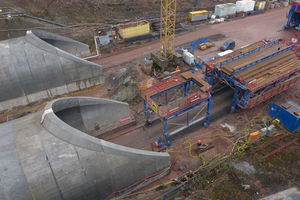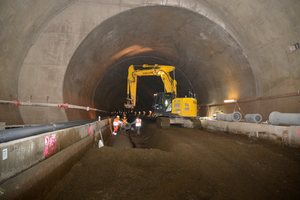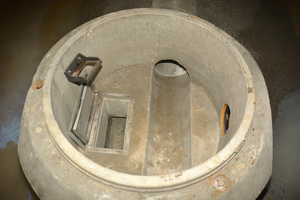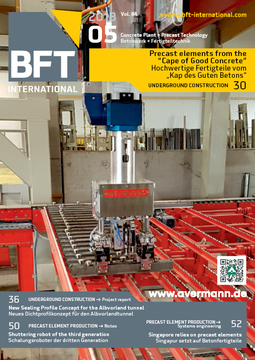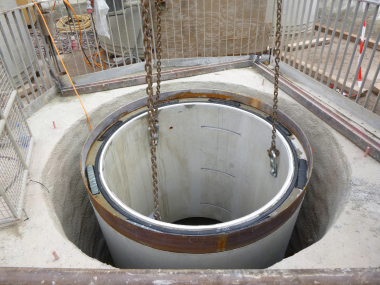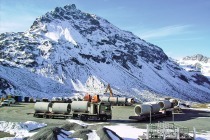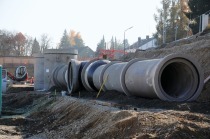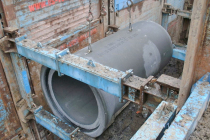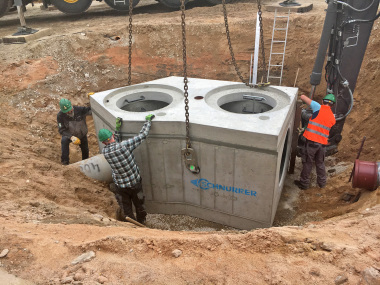Pipes and shafts for the second longest Tunnel in Germany
One of the largest tunnel construction projects in Germany is currently underway between the town of Helsa in the administrative district of Kassel and the city of Hessisch Lichtenau in the Werra-Meißner-Kreis. Since the middle of 2013, the state of Hesse has been building the Hirschhagen Tunnel, which is part of the future extension of A44 from Kassel on A7 to Herleshausen on A4. After its completion, the tunnel will be the second longest tunnel in Germany with a length of 4,204 m (southwest pipe) after the Rennsteig Tunnel in Thuringia. In the longitudinal dewatering of both pipes FBS quality monolithic reinforced concrete shafts are used, which offer some special advantages.
In keeping with the latest safety standards, the tunnel will have two pipes, which are connected to one another by seven transverse tunnels open to traffic and eight transverse tunnels safe to walk on. These tunnels serve as escape routes in dangerous situations to the other pipes and are access paths for the rescue workers. The tunnel pipes have two reinforced concrete shells: Their outer shells are 40 cm thick, the inner shells up to 80 cm; between both shells, there is a water-proof foil. The pipes are each 11 m high and 12 m wide. In the interior, they are 6.5 m high, and the two-lane carriageways are 7.5 m wide per pipe.
Tunnel longitudinal dewatering via concrete pipes DN 300
One important aspect after completion of the tunnel pipes and before the expansion of the lanes was tunnel longitudinal dewatering. Construction Supervisor Robert Greßler from Bauer Bauunternehmung GmbH from Walschleben describes the situation: “Due to the sag curve position of the tunnel it was designed to be water pressure-tight over its entire length. Therefore, the drainage system only provides for the draining of the entrained water from roads and walkways as well as of extinguishing water in the case of an accident.
The fluids that accumulate are first impounded in the lateral running slotted channels and are directed from there via baffle shafts to reinforced concrete pipes DN 300, which run below the road. From here the fluids are conveyed to the low point and pumped by means of a pumping plant over pressure lines to a runoff basin at the western portal of the tunnel.”
Prefabricated Shaft for Dewatering and Subsoil Drain
Originally, the advertised design T-WAS 2 included plans for a shaft to be built on site for the longitudinal dewatering and for the subsoil drain. Robert Greßler explains why the planners made the decision for a prefabricated shaft solution: “We decided to use prefabricated shafts instead of using shafts built on site for longitudinal dewatering and subsoil drain. These prefabricated shafts were tested in advance and so we could use them for the entire tunnel,” said Greßler.
Monolithic shaft system for cost-effective construction
The reinforced concrete pipes and the shafts were delivered by Finger Beton GmbH & Co. KG from the Thuringian plant in Sonneborn. Sales consultant Marcel Hellmund describes the advantages of the shaft system: “The shafts used here for longitudinal dewatering were produced in monolithic design. This means that both the base body and the conduit were manufactured from one mold in concrete grade C40/50 and hence have consistent quality. Therefore, an additional coating is not necessary. The decisive advantage is that the shaft system on the one hand makes an open conduit possible for the tunnel longitudinal dewatering and on the other hand makes a closed conduit possible for the tunnel subsoil drain,“ says Hellmund.
For good tightness all of the shaft linings have been equipped with suitable oil and gasoline resistant NBR gaskets at the plant. The shafts have stainless steel frames encased in concrete for the tunnel subsoil drain with integrated oil and gasoline resistant gaskets and suitable, screwed stainless steel covers.
FBS quality guideline guarantees quality well above the standards
Due to the stringent requirements for the tunnel structure the client stipulated a quality assurance that exceeds/goes beyond the usual requirements. Among other things, this stipulates that the required concrete grade and quick hardening of the reinforced concrete pipes and shafts be continuously verified within the scope of the in-plant and third-party monitoring. A continuous quality control from the raw materials to manufacturing to the end products in addition guarantees the FBS quality label, because the concrete components built here meet the high-quality standard of the German Trade Association for Concrete Pipes and Reinforced Concrete Pipes (FBS), which provides for a comprehensive factory production control. The quality of the products that bear the FBS quality label goes well beyond the standard and thus ensures a particularly long service life. This is attributable first and foremost to the good properties of the FBS pipes with regard to tightness of the pipes and the pipe connections, the load-bearing capacity, and the hydraulics.
If everything else goes according to plan, the tunnel will be open on 31 December 2020. According to the traffic forecast of Hessen Mobil around 31,200 motor vehicles per day will then be able to use the tunnel, which cost 324 million Euro to build.

